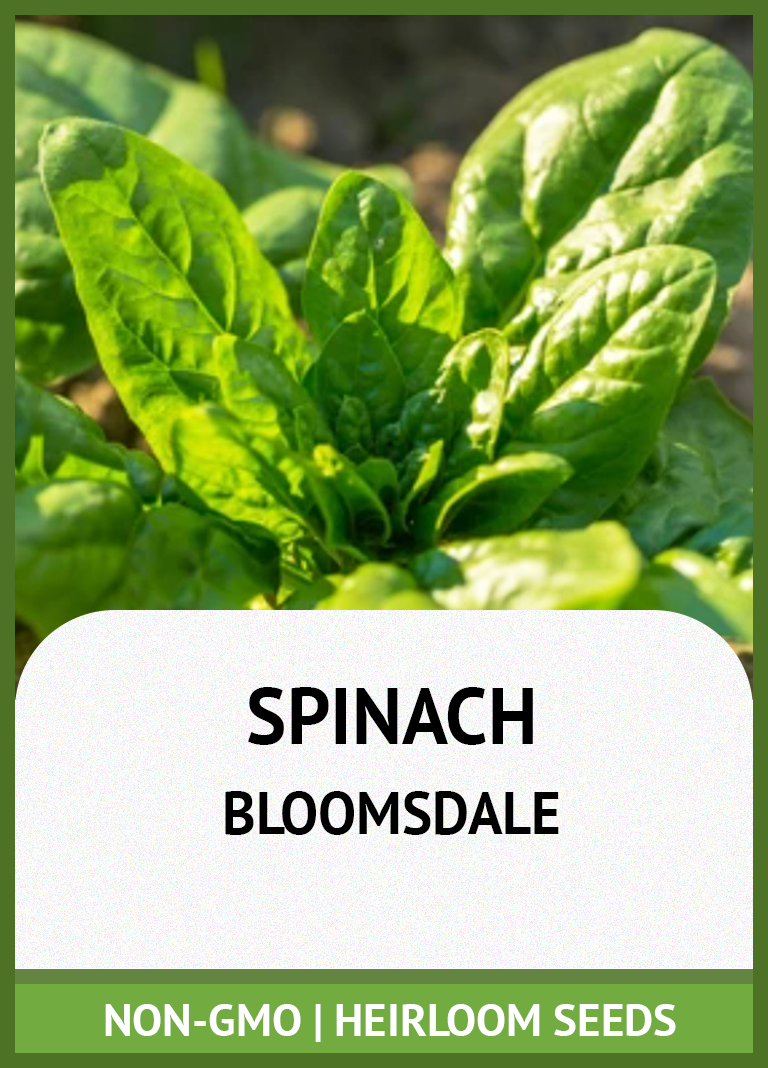Latin Name: Spinacia oleracea
Type: Open Pollinated, Heirloom, Cool Season
USDA Zones: 3, 4, 5, 6, 7, 8, 9, 10, 11, 12
Seeds per Ounce: 2,500
Planting Method: Direct Sow
Sunlight: Full Sun
Height: 12 Inches
Color: Green
Bloomsdale Longstanding is a spinach that may very well become your favorite! The large leaves of this variety are thick, dark green, and have a crinkled texture. Slow to bolt, and taking only 45 days to mature, this is a great choice for late spring and summer plantings.
In 1784, Englishman David Landreth moved to downtown Philadelphia to open the first commercial seed business in the United States. He and his brother Cuthbert developed this variety of spinach, which they named Bloomsdale Longstanding and introduced to their customers in 1826. Bloomsdale became known for withstanding temperature changes without bolting, and continues to be well loved by gardeners. In 1937, it won the prestigious AAS Award.
GROWING INFORMATION
Sowing:
Because Bloomsdale Longstanding spinach loves cool weather and can survive sub-zero temperatures when protected sufficiently, Bloomsdale spinach seeds should be planted as soon as the ground can be worked in spring, or after the heat of summer for a fall crop. Gardeners in regions with warmer winters will be able to grow spinach all winter long. Sow the seeds in deeply worked soil 1/2" deep and 2" apart in rows 12-18" apart, later thinning the seedlings to 4-8" apart. For a continuous crop, plant more seed every 10 days until the summer heat begins; spinach seeds go dormant above temperatures of 80-85 degrees F. Spinach loves shade, and can be planted underneath tall plants such as corn or pole beans.
Growing:
Because pulling weeds can disturb the roots of spinach, apply a layer of mulch. Keep the soil moist but not too wet, since an imbalance in the water supply can cause bolting. If the temperature rises above 80 degrees F, provide some sort of shade. Bloomsdale does tolerate some heat.
Harvesting:
Begin harvesting the spinach leaves as soon as they grow big enough for eating. If only individual leaves are being harvested, take the larger ones on the outside of the plant. Otherwise, harvest the entire plant by cutting it off at ground level; new leaves will grow. If the plant bolts and sends up a flower stalk, the leaves will be much stronger in flavor but can still be used.
Seed Saving:
Since spinach easily cross pollinates with other varieties of spinach, isolation may be necessary. For the best genetic diversity, save seed from 15-20 Bloomsdale spinach plants; do not save seed from plants that bolt early or have negative tendencies. Long days and warm temperatures will cause the plant to send up a flowering stalk. The seed pods will be mature soon after the leaves of the plant turn yellow. When handling the plant, gloves may be useful, as the pods can be prickly. The entire plant can be pulled to dry in a protected location, or left to dry outdoors if the weather is agreeable. Strip the pods from the stalk by running your hands up and down its length. Remove the dried leaves and other debris from the pods. The prickly pod can be removed or it can be planted just as it is. Store the Bloomsdale spinach seed in a cool, dry place for up to three years.

